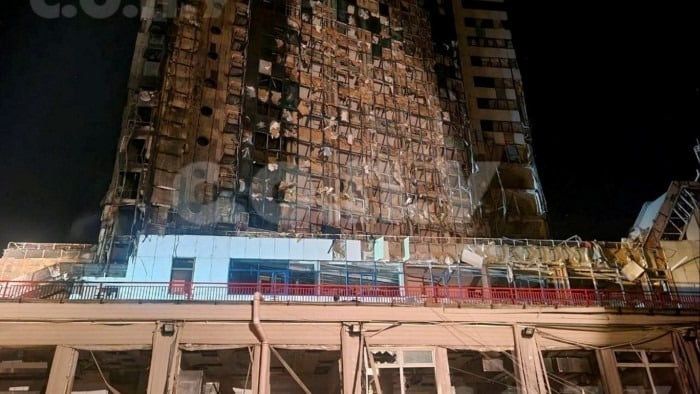Moscow continues attacks aimed at hobbling Kyiv’s grain exports
Russian forces pounded the Black Sea port city of Odesa as they continued their months-long campaign of air strikes aimed at hobbling Ukraine’s grain exports.
The Hotel Odesa, overlooking the provincial capital’s once picturesque harbour, was set ablaze in the early hours of Monday by missiles and drones while windows in the nearby passenger port where cruise ships docked before Russia’s full-scale invasion last year were blown out.
Oleg Kiper, governor of the southern Odesa region, which is home to multiple ports that have been blockaded and bombed as part of an effort to choke Ukraine’s exports of grain and other commodities including steel, said: “Russian terrorists attacked Odesa region with strike drones and two types of missiles.”
“Port infrastructure came under attack . . . destruction was recorded in a warehouse and one private house,” he said. Officials said several civilians were killed.
The emergency situations ministry said Russia had “destroyed” the landmark hotel that had stood at the foot of Odesa’s famous Potemkin Stairs. It released a video on social media showing the hotel and port burning overnight and photographs taken later of firefighters sifting through the wreckage. The hotel has stood empty for the past few years.
Andriy Yermak, Ukrainian president Volodymyr Zelenskyy’s chief of staff, wrote on Telegram: “Demilitarisation of Russia is a necessity. Because the world should not tolerate a madman with missiles.”
Ukraine’s army said a granary was also hit by a Russian missile.
Ukraine’s air force said 20 out of the 33 missiles and drones targeting Odesa and other regions in the overnight strikes had been intercepted by air defence systems.
The latest strikes on Odesa came after three cargo ships docked this weekend at the nearby Chornomorsk and Pivdeny ports. Oleksandr Kubrakov, Ukraine’s deputy prime minister, said the vessels were “using a temporary corridor established by the Ukrainian navy to export 127,000 tonnes of agroproducts and iron ore to China, Egypt and Spain”.
The corridor, which Ukraine has protected with long-range air defences and missiles provided by western allies, hugs the coast of the Odesa region and Ukraine’s southern neighbours, Romania and Bulgaria, both members of the Nato military alliance.
Coming under attack from Ukrainian missiles, Russia’s Black Sea Fleet based in the occupied Crimean peninsula has been unable to enforce a blockade after Moscow in July withdrew from a UN-brokered agreement permitting safe passage of vessels with grain heading to global markets during the war.
On Monday, Ukraine’s general staff said in a statement that Admiral Viktor Sokolov, commander of the Russian Black Sea Fleet, “was among 34 killed during a missile strike” by Ukrainian forces, which hit the headquarters of the Russian navy’s Black Sea Fleet in Sevastopol, Crimea, on Friday.
Though video footage released confirms that the headquarters was destroyed, the claim about the admiral being killed could not be independently verified and Russia has not confirmed it.
A handful of ships have so far used the corridor, including two vessels that docked at Odesa region ports this month and departed safely with grain cargoes.
Five vessels that were stranded at Odesa region ports amid Russia’s invasion have departed since mid-August with cargo including food and metallurgical raw materials.
Source: Financial Times



